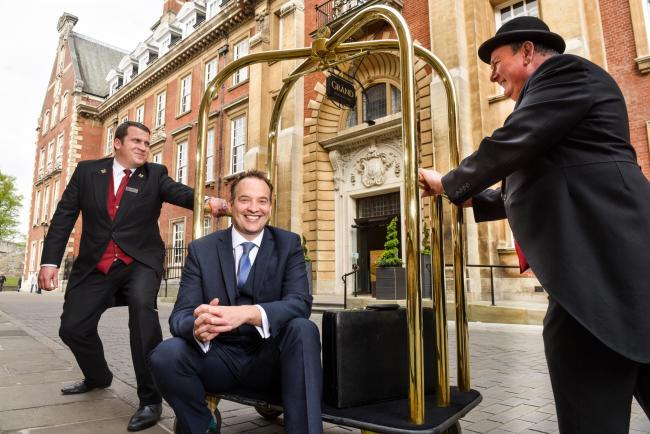HAY chairman Philip Bolson calls for tourism tax debate

ANY moves to introduce a tourist tax for York needs to be thoroughly debated and fair for all players, says the new chairman of HAY (Hospitality Association York).
Philip Bolson said he was “fundamentally opposed” to a tax – but acknowledged that councils were cash strapped.
Local authorities do not have the powers to impose a tourism tax but York Lib Dems have promised to explore introducing a voluntary levy as part of a manifesto before the May local elections.
Mr Bolson said the proposal was “being thrown around as a political hot potato” and a cause for concern.
“Any increase in levy or tax is not a good thing. Having said that we know councils don’t have a lot of money. We would say, if you are considering that, there needs to be a good debate. In York, less than 15 per cent of tourists stay in hotels. You are either missing an opportunity by not putting a levy on the other 85 per cent, or it is just unfair. We have many day tourists in York so let’s be fair. It should be across all businesses, whether an attraction, restaurant or bar.”
He said a voluntary levy still posed problems as it still had to be managed.
He also wants to see a level playing field among accommodation providers, crediting Air bnbs as a ‘fantastic entrepreneurial idea’, but stressing that they should be regulated as fairly as a hotel.
“You could buy a house in York and have five Air bnb lets in there and not run it as a business. In York, there are 1,600 Air bnb rooms on the market. Some are being let legitimately. We are concerned about the ones that are unregulated, that we don’t know about.”
Mr Bolson said he wanted his industry’s voice to be heard in the city.
“When I came to York one of my main aims was to get people to take hospitality seriously. People who run these businesses are ambitious, entrepreneurial, creative and can add real value to projects and meetings. They were not represented on York BID and the chamber [of commerce]. We are now, which means we can put our voice to the conversations.”
HAY has been asked to be involved in the council’s My City Centre project looking at challenges facing the high street and how to “balance the needs of visitors and residents”.
“Sometimes the ‘residents versus business’ is a nice headline. I know many people who live in the city love being here, love the hotels, restaurants and bars, and don’t think there’s a problem. There’s no doubt York is a small city and people love coming here, and that causes challenges. It gets very lively on a weekend but not all hotels and bars are to blame. We take our responsibilities to be a good business very seriously in terms of reducing our impact on the environment, employing people, supporting charities, and working with schools. In my hotel I have nearly 190 staff. Many live in York, pay their rent and contribute to the economy.”
He estimated The Grand contributes £10 million to the wider economy annually through its business rates, salaries, spends – 85 per cent of its food and drink comes from within the region, and the significant sums spent by its guests in the city.
Recruitment and retention are an issue, he said.“In York we struggle with infrastructure, in terms of travelling to and fro, and affordable housing. York is a small place. Some of the entry levels we and other industries might pay is a challenge.”
Mr Bolson added that the strength of HAY was in bringing people together.
“There’s nothing like getting together to talk about issues so you don’t feel quite so alone. One of the key aims for HAY is about offering that support. Between us we have seen most things and faced most challenges over the years, so instead of working in isolation and thinking our problem is unique, that’s the very human part of it – getting in a room and talking.”
